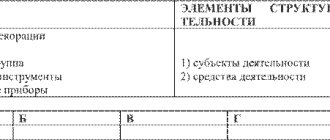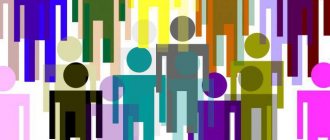A socio-psychological characteristic is a set of certain socio-psychological phenomena that characterize the properties, characteristics and qualities of an individual, various social groups, groups, etc., caused either by factors of the social environment, its influence, or by factors of a psychological nature.
The formation and development of an individual, social groups, and collectives are influenced by relationships within groups and individuals with each other, activities, political situation, ideology, cultural heritage, religion, upbringing and much more.
What is the social essence of man?
Social essence is a person’s ability to control his instincts, suppress and regulate his desires, engage in meaningful and purposeful activities, and comply with the rules accepted in society. Social essence determines our behavior and the types of activities that we allow ourselves in everyday life.
Among the many biological species inhabiting our planet, man stands out precisely because of his social essence. Of course, many animals also unite in packs and other communities, but they do this under the influence of instincts. People, on the contrary, are able to overcome instincts to fulfill their social roles.
As examples of the manifestation of a person’s social essence, the following can be noted:
- overcoming primitive instincts and “primitive feelings”;
- desire to change the world for the better;
- the need for active activity that is useful for society;
- the ability to improve and overcome one’s weaknesses;
- the ability and need to set goals and achieve them;
- the need for communication and other forms of interaction;
- need for recognition and respect.
If you look at Maslow's pyramid, you will notice that the first two levels are related to the satisfaction of basic biological needs. But the levels located above reflect various aspects of a person’s social essence.
Bonus at last
In conclusion, we give an example of a socio-psychological portrait of a conflict personality. Why conflict? Because every emotionally healthy person tries to avoid conflicts, not to quarrel or swear over trifles, and one of the effective methods on this path is to avoid conflicting personalities. Therefore, let's draw up a portrait of her so that we can know the enemy by sight and be one step ahead.
In psychological practice, a fairly wide range of conflicting personalities are distinguished, differing from each other in a number of characteristics. If you are interested in learning about this topic in more detail, we advise you to read the article “Psychological characteristics of the portrait of a conflict personality.” We will describe one of the most common types of troublemakers - complainers.
When determining the type of temperament of the complainant, of course, one should pay attention to the individual characteristics of the person, but often these are choleric people who are angry at some phenomena, for example, the behavior of a colleague, working conditions, hierarchy of relationships, etc.
Due to their unstable character type, such people sometimes complain due to an emotional outburst, because... they are subject to affects or bad mood. Moreover, the intellect of such a person can be quite developed, except for the fact that it is difficult for them to control their emotions. The orientation of the complainant’s personality may be based on positive motivation - the desire for better changes, the desire to restore justice. However, all these motives can be based on subjective views.
This short socio-psychological portrait can be drawn up using the example of a single individual. We hope that the portraits compiled by you will be more informative, accurate and detailed.
We wish you good luck and suggest taking a short knowledge test to better consolidate the material:
Differences between social essence and biological
As we have already found out, man is a biosocial being with a dual nature. The biological essence, which is the result of evolution, is combined in it with the social essence - the product of the development of society. They both have a significant impact on all aspects of human life and behavior. Moreover, each of them has certain features:
- The biological essence is manifested in the fact that a person is an ordinary animal with his own needs and instincts aimed at their realization. The basic biological needs of humans are the maintenance of life, reproduction and protection of offspring.
- The social essence is manifested in the fact that a person, being part of society, is able to control his instincts, suppress and regulate his desires, engage in meaningful and purposeful activities, and follow the rules. Social essence, like personality, is formed in the process of socialization.
Different authors speak differently about the relationship between the biological and social essences of man. Some contrast them, while others consider them closely related. The second point of view is more popular. It implies that a person has a biological essence from birth, but as he grows up and socializes, the social one plays an increasingly important role. At the same time, it is also aimed at realizing human needs, but through adaptation to the complex requirements of human society.
Why bother understanding other people at all?
Quite a logical question, isn't it? We live in peace, try to understand ourselves, and then study others too! Nevertheless, we assure you: this skill will be useful to you, and here’s the point...
Society is the social shell into which we find ourselves immediately after the body. Communications form the basis of any society, because it is no coincidence that the words “society” and “communication” have the same root. But communication is also a skill that must be learned to achieve effective interactions that benefit everyone involved. Profiling just helps to learn as much as possible about a person, to recognize the benefits and threats, advantages and risks brought as a result of this interaction. And drawing up a socio-psychological portrait is the first stage of personality analysis.
There is a point of view according to which it is impossible to create a socio-psychological portrait of a person based only on a short interaction. Ildar Zinurov, a writer and coach, a practicing psychologist of our time, adheres to precisely this position and argues that videos of the famous person being studied, riding in the elevator every morning with a neighbor or lectures with a teacher at a university cannot serve as a full-fledged basis for drawing up psychological portraits of these people [ AND. Zinurov, 2019]. And of course, profiling is not a miracle technique that helps you read a person in a couple of minutes.
In fact, this is a whole science and, perhaps, even a feature of an individual person. It is known that a person is born with such a quality as empathy (the ability to understand and grasp the state of another person, his emotions and mood), and this is one of the fundamental qualities of any profiler. By the way, profiling is often used in the field of criminology when investigating crimes, when compiling psychological portraits of criminals.
Here are examples of the most famous profilers from the history of criminology:
- Robert Ressler. Or, as he is also called, Sherlock Holmes of the 20th century. Ressler was an FBI agent, at the same time he lectured on criminology and wrote several books on the psychology of crime. In his works one can see many descriptions of portraits of murderers, rapists and other criminals. Ressler's character served as the inspiration for Jack Crawford's character in The Silence of the Lambs.
- Paul Ekman. Professor at the University of California at San Francisco, one of the most famous American psychologists, Paul Ekman is an expert in the field of detecting lies, as well as classifying human emotions. It is this area of scientific research and interests that, of course, does not leave aside such organizations as the FBI, CIA, large corporations, including the animation studios Pixar and Industrial Light and Magic. You may have even watched the popular TV series Lie to Me, for which a scientist served as a consultant.
- Joe Navarro. Cuban-American author who also spent time as an FBI agent. Navarro has written several books on nonverbal communication, mainly focusing on what lies behind a speaker's words. As a public speaker, Navarro advises people, teaches them to notice what is not usually said, and “read” others by their body language.
As you can see, knowledge from the field of profiling helps not only to acquire useful skills related to communications, but also to achieve career success. Often, corporations invite profilers to interviews in order to select a suitable candidate for a vacancy, and government security agencies even hunt professional profilers in order to investigate crimes more effectively. Therefore, you may need the ability to draw up a socio-psychological portrait of a personality as one of the key areas of profiling in a variety of situations [Zh. Rizabekova, 2020].
You can take a closer look at the biographies and scientific works of the above authors yourself, and we will share with you what a socio-psychological portrait of a personality consists of.
The formation of the social essence of man
You've probably heard the saying, "Work made a man out of a monkey." So it's not as meaningless as it seems. Indeed, labor aimed at satisfying one’s own needs and the needs of one’s tribe played a significant role in the transformation of man into a social being. Collaborative labor represented historically the first form of social interaction between people.
Initially, people engaged in joint production - hunting and gathering, then they learned to jointly grow crops and engage in other forms of production. With the advent of material values, which did not arise on their own, but were produced by people, such concepts as property and power began to form.
Over time, social interaction between people in the same tribe, as well as between neighboring tribes, became increasingly diverse. In particular, people realized that they could not only own resources, but also exchange them for those that were needed at the moment. Paleontologists say that people learned to trade and exchange during a period called the “Neolithic Revolution.” It is this event that can be considered the moment of formation of the social essence of man.
Social and psychological characteristics of the family
The main institution and unit of society is the family, which is characterized by the main socio-psychological feature - communication on 3 levels:
- Communication between spouses.
- Communication between parents and children.
- Communication between spouses and each other's parents and friends.
The family first begins in the form of marriage, then children are born, who eventually leave, leaving the “nest empty.” These are the stages of family development. And communication consists of closeness, sincerity, and the opportunity to discuss problems with other family members.
The family performs the following functions:
- Raising a new generation and passing on cultural experience to it.
- Preserving the health of each member, caring for others.
- Financial support and support for those who cannot or have not yet reached working age.
- Spiritual development of each member.
- Development of leisure, its enrichment.
- Determination of the social status of each member.
- Psychological protection and emotional support.
Social personality traits
Personality is a concept that reflects the social nature of a person. That is, this is not just an individual, but a subject of social relations, a member of society, possessing a unique set of socially significant traits. In sociology there are two approaches to the study of personality:
- A person is considered as an active subject, capable of cognizing and changing the world around him, influencing society, assessing himself and his place in society. Within the framework of this approach, social qualities of a person are considered to be those qualities that determine a person’s lifestyle, his self-esteem and his assessment by other members of society.
- Personality is considered as a set of social functions and roles. A person simultaneously performs several functions in different areas of life. Within the framework of this approach, social qualities of an individual are qualities that are formed and developed in the process of interaction with other members of society.
Basic social qualities of a person:
- self-awareness – the ability to be aware of oneself, evaluate one’s actions and understand how others evaluate them;
- self-esteem is a complex characteristic that shows how a person perceives his abilities, capabilities and other characteristics;
- social identification – identification by a person with a certain social group;
- activity – the ability to perform socially significant actions, take initiative when interacting with others;
- interests are the source of motivation necessary for active actions;
- beliefs - moral, ideological, religious and other views that determine a person’s perception of the world around him;
- life goals are global goals that a person perceives as his destiny.
From a psychological point of view, the presence of life goals is a key characteristic of a mature personality . Despite all the variety of possible options, all existing life goals can be grouped into four groups:
- material goods and comfort;
- development and creative activity;
- power and respect;
- spiritual improvement.
Peculiarities
From a socio-psychological point of view, the personality has the following characteristic features:
- is not only an object, but also a subject of social relations, since it has freedom of choice;
- is unique because it has an individual set of social and psychological characteristics;
- formed under the influence of society (socialization process);
- understands his attitude to various events, phenomena, social attitudes;
- understands his needs, desires and goals;
- strives for self-realization;
- independently forms an opinion about members of society with whom he enters into various communications;
- fully involved in relations with the surrounding reality;
- engages in specific activities that allow one to satisfy material needs and occupy a certain place in society.
Self-awareness and self-realization
Self-awareness and self-realization are important “building blocks” of a person’s social essence. Self-awareness is the ability of an individual to understand himself as a person, evaluate his capabilities and abilities, understand and predict how certain actions will be perceived by others, and also take responsibility for his own decisions and actions. It is self-awareness that determines how successfully a person can interact with other members of society.
Self-realization is the process of a person realizing his potential, achieving life and simply important goals. American psychologist Abraham Maslow believed that the need for self-realization is one of the highest human needs (along with self-actualization and self-development). He gave the following definition: self-realization is the fullest use of all talents, abilities and available opportunities to carry out personally significant activities.
Psychological portrait of personality
A psychological portrait is a comprehensive psychological characteristics of a person, giving an idea of their character and possible actions in specific circumstances. Experienced psychologists are involved in drawing up a portrait, since drawing up an accurate picture requires the ability to analyze information, as well as deep knowledge in the field of personal psychology. To form a reliable portrait, it is necessary to use as much information about the person as possible, and if in doubt, conduct additional diagnostics.
Forming a portrait involves testing to identify:
- temperament;
- character;
- intellectual level;
- individual consciousness;
- will;
- self-esteem;
- ability to communicate;
- other characteristics of the person.
Having completed the testing, the psychologist will evaluate the results and describe the nuances of character, and advise in which direction to work on yourself. Thanks to a portrait, you can understand, accept yourself, learn about your strengths and weaknesses, learn to feel your needs, and separate them from those imposed by society.
Psychology of human interpersonal relationships
The psychology of personal relationships considers interpersonal connections as a complex interaction between people, determined by relationships in society. Relations in society are official, fixed at a formal level. These are effective objectified interhuman connections. Interpersonal relationships are those experienced by the subject, mutual connections between people that can be realized. They are determined by emotions, nuances of the psyche. This is an expressive relationship, rich in emotions.
Interpersonal relationships are formed:
- cognitive aspects;
- affective aspects;
- behavior.
Cognitive, gnostic – cognition, understanding and awareness of information. Affective – emotional experiences due to mutual connections between persons. The behavioral aspect is realized by actions - friendly behavior, difficulties of interaction. It is carried out according to the norms programmed in culture and society.
Vertical and horizontal interpersonal relationships are possible. In the first case, the status of the participants is different, in the second - equal.
In the formation of interpersonal relationships, interpersonal compatibility plays an important role. It is determined by similarity, mutual complementarity and is expressed in satisfaction from mutual action and the results of this action. Against the background of compatibility, mutual sympathy often appears. The opposite phenomenon is incompatibility, which provokes antipathy.
2.6. Man, individual, personality
Social studies tutorial - Man
The concepts indicated in the title are often used as synonyms. However, there are significant semantic differences between them. Man is a being of the biological species homo sapiens. An individual is a representative of the human race, endowed with special traits that are different from other people. Each of us is an individual. Each person from birth is endowed with a special appearance, character, abilities, etc. The specific features that distinguish a person from the totality of his own kind constitute his individuality. It presupposes not only features of external appearance, but also a complex of socially significant qualities of an individual.
Each person is individual, but not every individual can become an individual. What qualities should a person have? At what age do they become one? There is no clear answer to these questions. From one point of view, a personality is a person who has a set of positive characteristics. According to another point of view, personality appears as something special, taken in a social aspect.
Personality is the integrity of a person’s social properties, a product of social development and the inclusion of the individual in the system of social relations through active substantive activity and communication.
An individual becomes a personality in the process of mastering social functions and developing self-awareness. Self-awareness is the awareness of one’s uniqueness as a subject of activity as a member of society. (The most important quality of a person is social activity, which can be considered in two manifestations. The first involves considering social activity as a property of a person, conditioned by his natural data and enhanced by qualities that are formed in the process of upbringing, education, communication and practical activity. Some people are naturally active , are energetic and active, which becomes noticeable already in early childhood. Others, on the contrary, are passive and inactive. Under the influence of many social factors, activity can develop, intensify or weaken. The second manifestation of social activity is associated with activity as some specific measure of activity. In this case activity can be expressed in specific indicators. An example is the measurement of labor activity. The criterion for social activity is the results of activity. The concept of “social activity” is closely related to the concept of “social subject” - a person capable of active social activity.
Sociology distinguishes such types of personality as normative (basic) and modal. A normative (basic) personality is a personality type accepted by the culture of the corresponding society, which most reflects the characteristics of a given culture. This is a kind of ideal type that society focuses on in raising the younger generation. In any social group, one can identify an individual with characteristics that most fully express the goals, conditions and patterns of functioning of this group. Thus, at a university there are ideas about what a student should be, in the army - a military man, at a factory - a worker, etc.
A modal (from the word “fashion”) personality is a person committed to the same cultural patterns as the majority of members of a given society. That is, this is the personality type that is most common in a given territory and at a given point in time. Modal personality reflects the real position of a person in society. For example, in the last decade of the 20th century. In Russia, the type of profit-oriented trading person has become widespread. It should be noted that in society there may be several types of modal personality, depending on the presence of different social groups.
The modal personality never corresponds to the normative one, although sometimes there are some overlaps. Deviations from the normative type, if they are quite significant, encounter resistance from society, which forces individuals to comply with generally accepted norms. In addition, a normative personality is more constant, while a modal personality is more dynamic. As living conditions change, personality types also change. Thus, a democratic society is characterized by a politically active type of personality, and an anti-democratic one is characterized by a type that obeys guidelines.
In conditions of radical changes in social life, a marginal personality type is becoming widespread, i.e. borderline personality: a person who has fallen out of his previous social environment and has failed to adapt to changed circumstances experiences mental discomfort, uncertainty about the future and seeks to join any social group to stabilize his position.
The formation of personality is influenced by many factors. First of all, it is heredity. From parents a person receives a set of individual properties of appearance, health, psyche, etc. But at the level of heredity, only psychophysiological properties are transmitted to a person. In most cases they play a secondary role. They can act as the main ones when a person is significantly different from those around him. In extreme cases, these are either physical and mental pathologies, or giftedness.
Another, more important factor is education - the process of purposeful influence on a person to form certain qualities in him. A person experiences educational influence from parents, teachers, and friends.
An important factor in personality formation is the social environment, i.e. those people among whom a person revolves, on whom he depends or who depend on him, on whom he is oriented or who are oriented towards him. There is a macro-environment (society as a whole, the system of education, upbringing, etc.) and a micro-environment (work collective, family, school). The individual and society interact with each other. Society can influence the formation of an individual and his actions. At the same time, the individual is capable of changing the social environment. The relationships that are formed and implemented in the process of such interaction are called social.
Social relations are a stable system of connections between individuals that have developed in the process of their interaction with each other in the conditions of a given society. Social relations develop between people included in various social groups. Man cannot exist in isolation. In his activities he must take into account the interests of other people. So, to achieve success at work, it is not enough to be a good specialist. It is necessary to be able to build the right relationships with both bosses and colleagues. All human actions are derivatives of social relations, which include two levels: the social level (interaction of people through various social groups) and the psychological level (direct interpersonal relationships).
A situation is possible when, despite favorable conditions, the process of personal development is suspended, since the person himself does not make any effort to do so. For the formation of personality, a person’s desire for self-improvement is necessary. Every person has enormous potential, which can only be revealed if a person sets goals for himself and makes attempts to achieve them.
A person’s abilities play an important role in the development of personality. Abilities are the individual mental qualities of a person that allow him to successfully acquire knowledge, skills and abilities. The wider a person’s range of interests, the easier it is to identify his true abilities. There are often cases when parents force a child to engage in some type of activity (mathematics, sports), but he has abilities in a completely different area (for example, in literature and art).
A clearly expressed ability is called talent. Ability and talent are innate qualities. But if they are not developed, they may fade away. Talent needs to be recognized in a person in time. This is the task of parents, schools, and other public institutions. The development of talent largely depends on the person himself. We call a talented person who constantly develops his abilities and achieves high results in his activities a genius. All brilliant people who left their mark on history were individuals.
But not only talents and geniuses become individuals. Personality is the result of the formation of an individual, the development of his abilities, and the accumulation of experience. A person is characterized by developed self-awareness, a strong position in life, the ability to make decisions and the ability to take responsibility for one’s actions. She always has her own point of view on certain problems and in some cases can oppose herself to society. A person is distinguished by developed willpower, the ability to force himself to act as necessary in a given situation.
Personality formation occurs during socialization. Socialization is the process of mastering social roles, acquiring social statuses and accumulating social experience. The process of socialization begins with a person’s birth and continues throughout his life.
The human life cycle consists of certain age stages: childhood, adolescence, maturity and old age. The age boundaries of these stages are quite blurred. Nevertheless, there are signs by which one can distinguish a child from a youth or a mature person from an old man. Depending on age, stages of socialization are also distinguished. The period of childhood and adolescence constitutes initial socialization, the period of maturity and old age constitutes continued socialization. In the process of socialization, a person is influenced by parents, school, friends (at the stage of initial socialization), and then by college, the army, work, and the state (at the stage of continued socialization).
Education plays an important role in socialization—instilling in a person the values and ideals common in society. Education, as noted above, is a process of purposeful influence on a person to develop certain qualities in him. But there is another side to education, namely, the spontaneous assimilation of rules of behavior. In the first case, education is carried out by parents, school, and university. In the second, the child perceives patterns of behavior, imitating parents, older comrades, idols of cinema, pop, and sports. Purposeful education is always associated with the task of forming a set of positive qualities in a child. Negative patterns of behavior can also be spontaneously absorbed.
In upbringing, purposeful and spontaneous can correspond to each other, or they can come into conflict, for example, when parents constantly tell their child about the dangers of smoking, but they themselves smoke. Therefore, the upbringing process requires responsibility and self-control on the part of parents.
But education does not end when a person grows up. The process of learning norms of behavior continues throughout life. Only its direction changes. If in childhood a person was raised by those around him, then with age he influences himself, forcing him to perform certain actions. This process is called self-education.
Self-education is a property of a developed personality. It requires willpower and the desire for better results. Dissatisfaction with the achieved position, efforts to move forward, a state of constant search are signs indicating the status of an individual. A society consisting of bright personalities develops more dynamically and moves faster along the path of social progress.
Questions and tasks
1. What is the difference between the concepts “person”, “individual”, “personality”?
2. What is social activity? What are its manifestations?
3. Describe the concepts of normative and modal personality. What is their relationship? Give examples.
4. What factors influence the formation of personality?
5. What role do abilities and talent play in the development of personality?
6. What is socialization? What are its stages? What factors influence the socialization process?
7. What role does education play in the development of personality? What is the relationship between purposeful and spontaneous education?
8. What is the importance of self-education? Are you involved in your own education?
9. Read the statement by G.V. Plekhanov.
“A great man is great because he has characteristics that make him most capable of serving the great social needs of his time... A great man is precisely a beginner because he sees further than others and wants stronger than others. He solves scientific problems put on the agenda by the previous course of mental development of society; it indicates new social needs created by the previous development of social relations; he takes upon himself the initiative to satisfy these needs.”
What characteristics of a great man does he highlight?
2.7. The spiritual world of man →
← 2.5. Communication
2.6. Man, individual, personality
2.9 (58.75%) 64 votes










